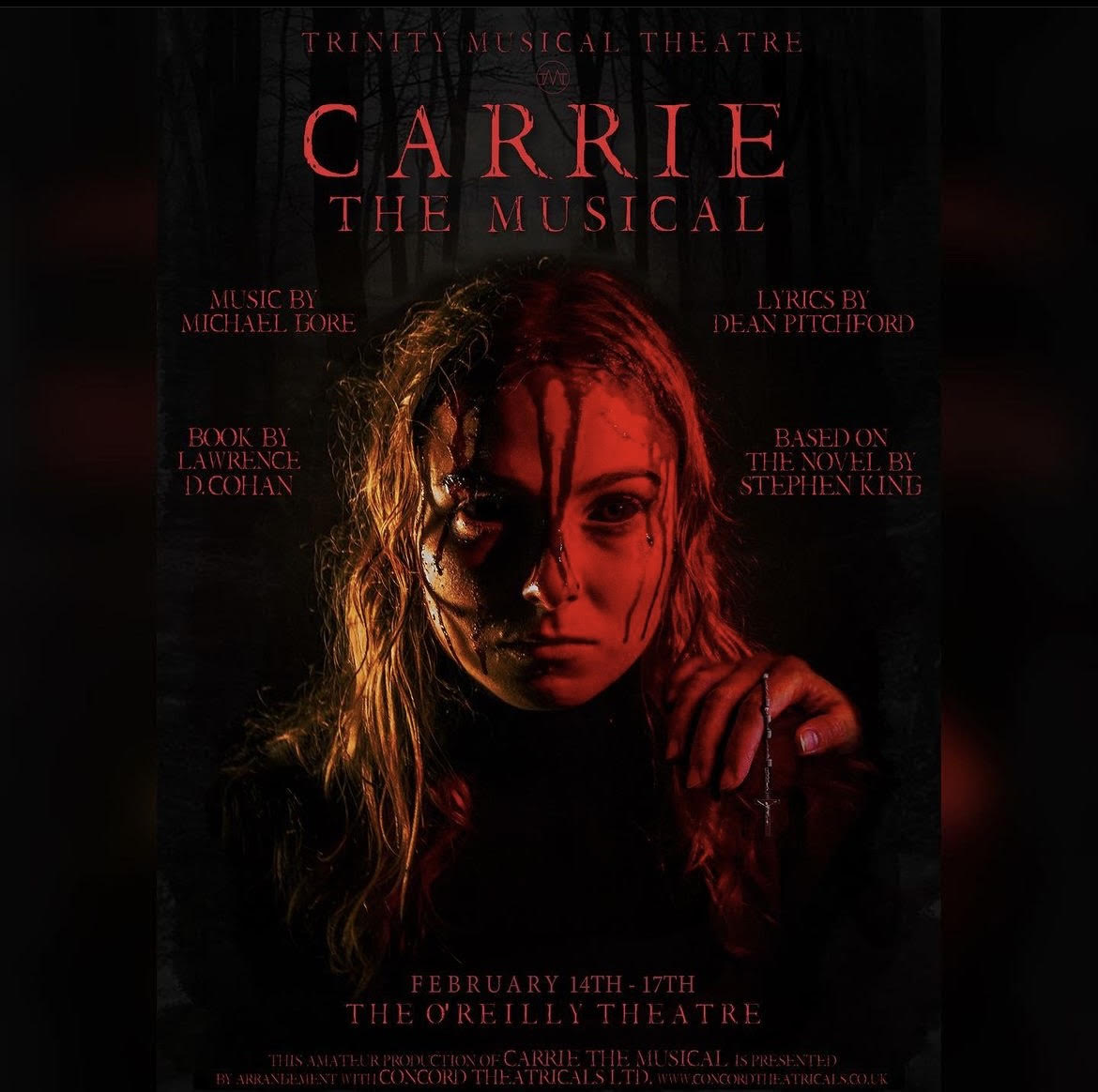King’s blood-curdling story was first immortalised in print (1974), followed by screen (1976), and ultimately; stage (1988). The initial stage premiere of this musical in the late 80s was notoriously disastrous. Its early closure cemented its status as one of the most infamous Broadway flops in history. Decades later, in 2012, Carrie’s stage revival ran as a success.
The show opens, and we are instantly met with the theme of death. Sue Snell (played by Hannah Roche) perfectly sets the scene with her chilling portrayal of how the events we are about to witness affect her. This is followed by a transition to a contemporary “Chamberlain High School,” 1979. Here the audience is presented with a stereotypical high school dynamic which includes jocks, cool kids, the works! But there seems to be only one outlier: Carrie White. Carrie (played by Aoife Mccormack) is undeniably nervous, and for good reason. She lives a tortured life at the hands of her peers. When Carrie experiences her first (rather untimely) period during her post-gym-class shower, she is frightened and mortified. The girls gang up on her, the mob is led by Chris Hargensen (played by Juliet Hill), and Sue Snell is an almost primitive scene, which the gym teacher thankfully extinguishes; Miss Gardener (played by Beth Strahan), is one of the more compassionate characters. Carrie reintroduces the theme of death when she thinks her period is a sign of the end of her life. Which, in many ways, was this foreboding incident.
This event leads us to the introduction of Margaret White (played by Lily-Kate Hernes), Carrie’s almost violently religious mother who sees her inauguration into womanhood as a sin and feels her ability to protect her little girl slipping away. Carrie must repent in her crucifix-adorned kitchen, while Margaret worries for her future. It is at this point that we find out that Carrie’s idiosyncrasies extend beyond her beliefs or timid mannerisms. Her telekinesis is divulged to us but not the cause of any major upset, yet.
The constant switch between Carrie’s agonising emotional abuse and the celebrations of students in anticipation for the beginning of their adulthood is poignant and sheds light on how profoundly different the life Carrie leads is compared to her peers. The incredible band in support of the actors generates an unforgettable atmosphere where the audience is constantly thrown between the two paradoxes!
In light of the wretched incident after gym class, Miss Gardener forces an apology out of the girls. When Chris’s apology turns nasty, she is banned from prom. Sue’s guilt eats at her, knowing that she played a part in humiliating Carrie. She makes it her mission to make things up to her and her “perfect” boyfriend, Tommy Ross (played by Will Robbins). The two conjure up a plan for Tommy to bring Carrie to the prom to make her feel included.
Margaret warns the virtuous Carrie to stay away from boys. Still, with her newly honed telekinetic abilities, Carrie takes it upon herself to let her mother know that she is more empowered than ever. Meanwhile, Chris and her delinquent boyfriend, Billy Nolan (played by Colm Lombard), evoke a scheme to ruin Carrie’s white.
What starts as an uplifting, hopeful scene of students preparing for their impending graduation and Carrie becoming more confident is interrupted by her mother’s almost clairvoyant concerns for the evening. There will be a rain of blood Margaret sings in anticipation for the evening ahead. As the dance progresses, Tommy and Carrie are (falsely) coronated student royalty; Chris and Tommy launch their plan by pouring pigs’ blood over their new queen’s head. Something snaps in Carrie; she can no longer take the constant torment and uses her powers to eliminate every single soul at prom. Sue’s intuition leads her to Chamberlain High School, where she finds the wreckage of what Carrie had done. After witnessing this powerful scene of destruction, she runs to the Whites’ residence to find the aftermath of a brutal double murder: filicide turned matricide.
In this story, Sue Snell is the sole survivor of a truly gut-wrenching story of how people are not always what we perceive them to be. Hannah Roche beautifully depicts the sadness and shock that can only be felt by one who has lost as much as she. I had goosebumps from the minute she stood on stage until she closed the show two and a half hours later.
“Aoife Mccormack took the spectacle that is Carrie White and made her spectacular”
Aoife Mccormack took the spectacle that is Carrie White and made her spectacular. Her vocal and actoral performances do justice to the iconic character of Carrie White. This is only made more impressive accompanied by the unbelievable fact that this is Aoife’s first lead role in TMT (or anywhere outside of school) and a mammoth one at that. She was simply a raving success.
Lily-Kate (also TMT chairperson) told Trinity News that her spectacular portrayal of Carrie’s hauntingly protective mothers was made possible by her team around her due to her extra responsibilities within the society. Her glowing reviews about everyone involved in the production; from director to ensemble, are entirely warranted. I am sure if you were lucky enough to see the show yourself, you, too, share this affinity. After spending several hours in the O’Reilly Theatre graced by those in TMT, all I can say is: someone tell 2012 that this is the only Carrie revival that matters!






